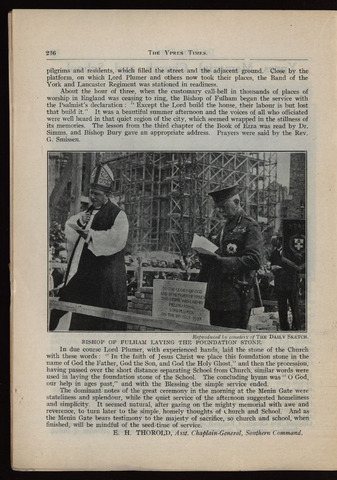236
Tuf. Vprfs Timfs.
pilgrims and residents, which filled the street and the adjacent ground. Close by the
platform, on which hord Plumer and others now took their places, the Band of the
York and hancaster Regiment was stationed in readiness.
About the hour of three, when the customary call-bell in thousands of places of
worship in England was ceasing to ring, the Bishop of Fulham began the service with
the Psalmist's declaration Except the hord build the house, their labour is but lost
that build it." It was a beautiful summer afternoon and the voices of all who officiated
were well heard in that quiet region of the city, which seemed wrapped in the stillness of
its memories. The lesson from the third chapter of the Book of Ezra was read by Dr.
Simms, and Bishop Bury gave an appropriate address. Prayers were said by the Rev.
G. Smissen.
Reproduced by courtesy of The Daily Sketch.
BISHOP OF FUIyHAM LAYING THK FOUNDATION STONK.
In due course hord Plumer, with experienced hands, laid the stone of the Church
with these words "In the faith of Jesus Christ we place this foundation stone in the
name of God the Father, God the Son, and God the Holy Ghost," and then the procession,
having passed over the short distance separating School from Church, similar words were
used in laying the foundation stone of the School. The concluding hymn was O God,
our help in ages past," and with the Blessing the simple sendee ended.
The dominant notes of the great ceremony in the morning at the Menin Gate were
stateliness and splendour, while the quiet service of the afternoon suggested homeliness
and simplicity. It seemed natural, after gazing on the mighty memorial with awe and
reverence, to turn later to the simple, homely thoughts of church and School. And as
the Menin Gate bears testimony to the majesty of sacrifice, so church and school, when
finished, will be mindful of the seed-time of service.
E. H. THOROIJj, A sst. Chaplain-General, Southern Command.

